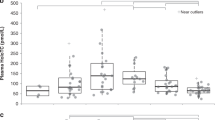Abstract
Mildly cobalamin-deficient elderly were supplemented with 1000 μg cobalamin (group C, n=34), 1000 μg cobalamin with 400 μg folic acid (group CF, n=31) or a placebo (n=30) for 6 months. Participants provided one single blood sample 3, 5 or 7 months after cessation of supplementation to monitor early changes in plasma concentrations of cobalamin, holotranscobalamin (holoTC) and methylmalonic acid (MMA). At the end of supplementation (groups C+CF), one participant met our criteria for mild cobalamin deficiency, as did 13, 14 and 43% of the participants assessed at respectively 3, 5 and 7 months post-supplementation. Cobalamin and holoTC declined on average with 47 and 56% relative to concentrations at the end of supplementation for the group assessed at 7 months post-supplementation. Essentially similar declines were observed for those participants assessed at 3 and 5 months post-supplementation. Mean MMA concentrations increased by 15% (P=0.07) in those participants assessed at 3 and 5 months post-supplementation, and increased by 50% (P=0.002) in those participants assessed at 7 months post-supplementation. Considering MMA as a sensitive tissue marker for cobalamin status, oral supplementation may afford adequate cobalamin status for a period of up to 5 months after cessation in the majority of participants.
This is a preview of subscription content, access via your institution
Access options
Subscribe to this journal
Receive 12 print issues and online access
$259.00 per year
only $21.58 per issue
Buy this article
- Purchase on Springer Link
- Instant access to full article PDF
Prices may be subject to local taxes which are calculated during checkout

Similar content being viewed by others
References
Amin S, Spinks T, Ranicar A, Short MD, Hoffbrand AV (1980). Long-term clearance of [57Co]cyanocobalamin in vegans and pernicious anaemia. Clin Sci (Lond) 58, 101–103.
Baik HW, Russell RM (1999). Vitamin B12 deficiency in the elderly. Annu Rev Nutr 19, 357–377.
Eussen SJ, de Groot LC, Clarke R, Schneede J, Ueland PM, Hoefnagels WH et al. (2005). Oral cyanocobalamin supplementation in older people with vitamin B12 deficiency: a dose-finding trial. Arch Intern Med 165, 1167–1172.
Eussen SJ, de Groot LC, Joosten LW, Bloo RJ, Clarke R, Ueland PM et al. (2006). Effect of oral vitamin B-12 with or without folic acid on cognitive function in older people with mild vitamin B-12 deficiency: a randomized, placebo-controlled trial. Am J Clin Nutr 84, 361–370.
Hathcock JN, Troendle GJ (1991). Oral cobalamin for treatment of pernicious anemia? JAMA 265, 96–97.
Henning BF, Tepel M, Riezler R, Naurath HJ (2001). Long-term effects of vitamin B(12), folate, and vitamin B(6) supplements in elderly people with normal serum vitamin B(12) concentrations. Gerontology 47, 30–35.
Hvas AM, Nexo E (2005). Holotranscobalamin – a first choice assay for diagnosing early vitamin B deficiency? J Intern Med 257, 289–298.
Immulite (2000) Available at: http://diagnostics.siemens.com/siemens/en_GLOBAL/gg_diag_FBAs/files/package_inserts/immulite_2000/Anemia/12kvb-22.pdf Accessed January 24, 2007.
Kuzminski AM, Del-Giacco EJ, Allen RH, Stabler SP, Lindenbaum J (1998). Effective treatment of cobalamin deficiency with oral cobalamin. Blood 92, 1191–1198.
Lindenbaum J, Healton EB, Savage DG, Brust JC, Garrett TJ, Podell ER et al. (1988). Neuropsychiatric disorders caused by cobalamin deficiency in the absence of anemia or macrocytosis. N Engl J Med 318, 1720–1728.
Morkbak AL, Heimdal RM, Emmens K, Molloy A, Hvas AM, Schneede J et al. (2005). Evaluation of the technical performance of novel holotranscobalamin (holoTC) assays in a multicenter European demonstration project. Clin Chem Lab Med 43, 1058–1064.
Schneede J, Ueland PM (2005). Novel and established markers of cobalamin deficiency: complementary or exclusive diagnostic strategies. Semin Vasc Med 5, 140–155.
Stabler SP (2000). B12 and nutrition. In: Banjeree R (ed) Chemistry and Biochemistry of B12, Wiley and Sons: New York, pp 343–365.
van Asselt DZ, de Groot LC, van Staveren WA, Blom HJ, Wevers RA, Biemond I et al. (1998). Role of cobalamin intake and atrophic gastritis in mild cobalamin deficiency in older Dutch subjects. Am J Clin Nutr 68, 328–334.
Windelberg A, Arseth O, Kvalheim G, Ueland PM (2005). Automated assay for the determination of methylmalonic acid, total homocysteine, and related amino acids in human serum or plasma by means of methylchloroformate derivatization and gas chromatography-mass spectrometry. Clin Chem 51, 2103–2109.
Acknowledgements
We are indebted to the participants who took part in this study, and to the directors and staff of the care facility homes for their support. We thank Ove Aarseth, Halvard Bergesen and Randi Mjelde Heimdal at the LOCUS of Homocysteine and Related Vitamins in Bergen for carrying out the HoloTC and tHcy assays, Arno van Rooij at the Homocysteine Unit of Lab Pediatrics and Neurology in Nijmegen for carrying out the MMA assays, and Laura van de Ven and Elham Fallah for their assistance in data collection. This work was sponsored by the Dutch Dairy Association, Zoetermeer, the Netherlands; and the Foundation to Promote Research into Functional Cobalamin Deficiency and the European Union BIOMED Demonstration Project.
Author information
Authors and Affiliations
Corresponding author
Additional information
Contributors: SJPME, LCPGMdG, GJH and WAvS contributed to the study design; SJPME supervised the data collection; PMU and HJB performed laboratory analysis; SJPME drafted the manuscript, and all other authors contributed to data analysis and critically revised the manuscript. None of the authors had any financial or personal conflict of interest.
Rights and permissions
About this article
Cite this article
Eussen, S., Ueland, P., Hiddink, G. et al. Changes in markers of cobalamin status after cessation of oral B-vitamin supplements in elderly people with mild cobalamin deficiency. Eur J Clin Nutr 62, 1248–1251 (2008). https://doi.org/10.1038/sj.ejcn.1602834
Received:
Revised:
Accepted:
Published:
Issue Date:
DOI: https://doi.org/10.1038/sj.ejcn.1602834


